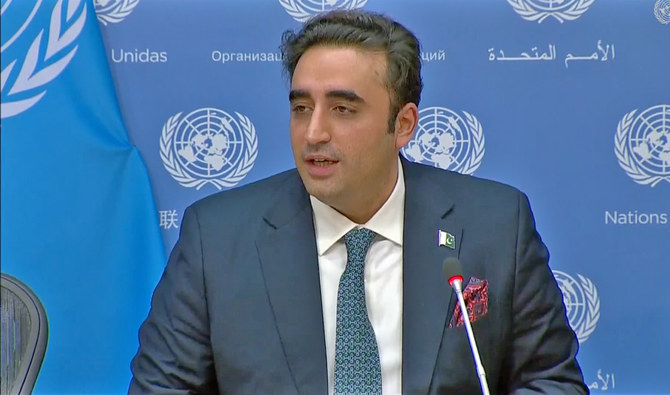ISLAMABAD: Pakistan’s Foreign Minister Bilawal Bhutto-Zardari on Thursday praised Iranian women protesting for their rights in the country, referring to them as “very brave” for pursuing peaceful means to achieve their objectives.
Iran has been gripped by nearly three months of widespread protests — which officials describe as “riots” — since the death of Mahsa Amini, a 22-year-old Iranian of Kurdish origin. Amini died in police custody on September 16, three days after her arrest in Tehran by the country’s morality police for allegedly breaching the Islamic dress code for women.
Amini’s death under mysterious circumstances prompted allegations that she had been tortured by Iranian police, a charge authorities vehemently deny. Angry protests sparked by defiant young women, many of whom took off their headscarves and burned them in public, went viral on social media. The protests are being seen as the biggest challenge to Iran’s clergy since the past couple of decades.
The foreign minister, in a press briefing after hosting the Ministerial Conference of G-77 and China in New York, said that while Pakistan does not support rioting or violence, it supported Iranian women’s peaceful protests.
“The Iranian women protesting in their country are very brave. And they are not only being encouraged by us but also within Iran,” Bhutto-Zardari said.
“[If we look at] Iran’s history, we have seen that time and time again, Iranians have been very brave in their political activities, their activism, and their protesting.”
He added that as a result of the protests staged by Iranian women, “we are hearing about potential reforms within Iran and I believe that it will be an achievement for the brave women of Iran.”
The foreign minister also shed light on women’s issues in Afghanistan, saying that Pakistan cannot give up on engaging with Afghanistan as the country’s issues, especially those related to women, will not resolve on their own if the world turns its back on it.
“I know of horrific stories [from Afghanistan]. There are child marriages and they are not marrying off their young girls out of choice or because they want to. It’s because they physically can’t afford to feed their children,” the minister said.
“They think it’s better to have a little girl married off so that someone could take care of them”.
Bhutto-Zardari said he wanted to champion women’s rights more than anyone and believed that it was Islam, before many other religions, that granted women their due rights.
“It is my country that produced the first female Muslim prime minister, so we will not compromise on women’s rights,” he said. “But I want to be practical about how we can achieve [that in Afghanistan]. I don’t believe we can starve the Afghans to force them to follow women’s empowerment.”
He added that there was not only a need for humanitarian assistance in Afghanistan but a conducive economic environment to allow those who do want to deliver.
“I think history has demonstrated that in the autocratic or theocratic regime, when the economic times are tough, then rights are contracted rather than expanded,” he said.
“I don’t believe that with the Afghan money frozen and with their banking channels shut, we will see progress on women’s and other issues,” he said.
















